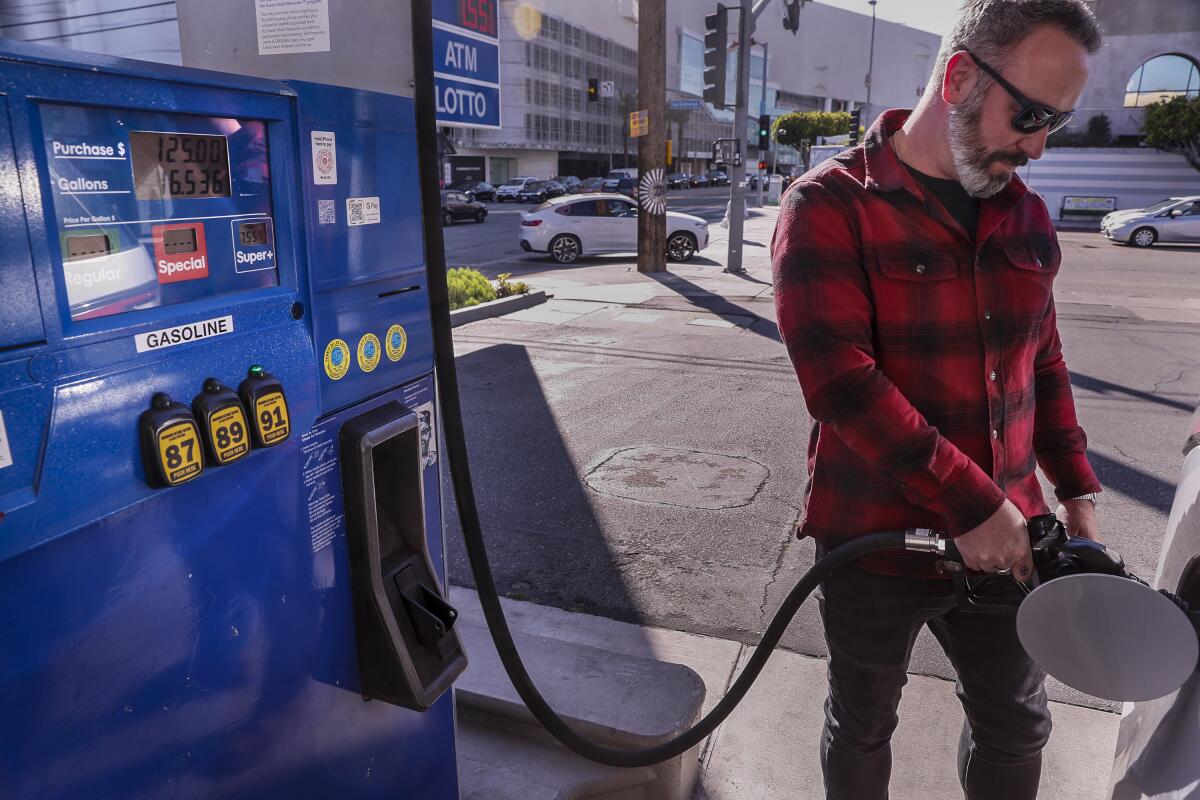Inflation rose again in February, probably headed higher amid Russian war in Ukraine

- Share via
WASHINGTON — In a development that cast a dark shadow over an otherwise strong economy, inflation surged in February to a new four-decade high with the cost of gasoline and other consumer goods and services climbing at an accelerating pace.
The consumer price index rose 0.8% in February from January, pushed up by sharp increases in costs for energy and food, according to a Bureau of Labor Statistics report issued Thursday.
The February gain would translate to a 7.9% inflation rate for the year, which is the highest since the 12-month period that ended in January 1982.
The rise in inflation, a trend that began nearly a year ago, will probably be exacerbated by Russia’s war in Ukraine, which already has pushed gas prices higher in the two weeks since fighting began. Although overshadowed in a news cycle dominated by reports from the war front, rising costs remain a top issue in the U.S. as the White House has worked to blunt Republican attacks on the Biden administration’s failure to tame inflation.
President Biden suggested in a statement that the February report “is a reminder that Americans’ budgets are being stretched by price increases and families are starting to feel the impacts of Putin’s price hike.”
The 6.6% increase in gas prices last month, Biden said, was “a large contributor to inflation” and a result of how “markets reacted to Putin’s aggressive actions.”
California’s small businesses waded through COVID to a rebound in consumer spending, only to face rising costs for supplies and wages.
The rising prices have been a wet blanket on an otherwise robust economy over the last year, as unemployment has fallen below 4% and the workforce has grown.
“As I have said from the start, there will be costs at home as we impose crippling sanctions in response to Putin’s unprovoked war, but Americans can know this: The costs we are imposing on Putin and his cronies are far more devastating than the costs we are facing,” Biden said.
Acknowledging “that higher prices impact a family’s budget,” Biden noted he has already started to release millions of barrels of oil from the nation’s strategic reserves and is taking additional steps to ease bottlenecks in global supply chains.
If consumer costs don’t stabilize soon, Biden and Democrats may pay a price in November’s midterm elections, even though the public has thus far been broadly supportive of the administration’s response to Russia, which has included stiff economic sanctions and now a full ban on oil imports.
Economists had thought inflation could start drifting lower early this year as energy prices and other supply-and-demand imbalances caused by the COVID-19 pandemic leveled off. But Russia’s invasion of Ukraine has scrambled those assessments.
Surging gasoline prices were largely behind the increase in inflation last month, and some analysts say consumer inflation could climb into double digits this spring.
“The inflation fire was already hot and now with war-driven inflation added to the mix, it will grow even hotter,” said Christopher Rupkey, chief economist at Fwdbonds in New York.
The national average price for a gallon of gas stood at $4.32 on Thursday, according to the American Automobile Assn., up nearly 25% from a month earlier. The average price in California is $5.694, up from $3.775 a year ago, AAA said.
Although many Republicans have praised Biden for seeking to punish Putin without committing the U.S. to the military conflict in Ukraine, GOP leaders have also sought to pin rising gas prices on the president while calling for more domestic oil and gas production to offset the ban on Russian energy.
Sen. Rick Scott (R-Fla.), who is leading the Senate GOP campaign arm, blasted Biden as having “failed at every aspect of the job.” The Republican also accused Democrats of engaging in “reckless government spending” that, he argued, has caused runaway inflation.
Without any GOP support, Democrats passed a $1.9-trillion coronavirus relief package last March that sent $1,400 checks to a majority of households and extended a number of other benefits aimed at easing economic hardship resulting from the prolonged pandemic.
“America’s hardest-working and poorest families, like mine growing up, cannot afford nearly three more years of radical policy and harmful ignorance from this president. Americans deserve better,” Scott said in a statement.
“We are paying the price for runaway Democrat spending and Joe Biden’s war on American energy,” Sen. John Barrasso (R-Wyo.) said in a statement. “The only solution is to reverse course. The president must stop his runaway government spending, open the economy and unleash American energy.”
Democrats have defended the fiscal spending as an appropriate response to a devastating once-in-a-century pandemic, and economists are divided on how much the federal spending has contributed to the run-up in inflation.
Stuck at home due to the pandemic, consumers changed their spending habits. Many, for example, substituted spending on such services as travel for manufactured goods. That change created serious strains on producers and supply chains.
At the same time, many older workers decided to retire early, while younger people quit their jobs to look for better opportunities, causing a tightening of the labor market that drove up wages and prices.
In the view of some analysts, inflation might have peaked by now, had it not been for the problems stirred up by Russia, giving Biden a legitimate case to make about who’s to blame.
“Before, in the minds of voters, it was Biden’s fault, and he was definitely getting blamed for it,” said Mark Zandi, chief economist at Moody’s Analytics. “Now, he can rightly say, ‘What am I supposed to do? We have to fight this guy.’”
There’s little that Biden can do about rising prices. Controlling inflation is the domain of the Federal Reserve, which is expected to raise interest rates by a quarter of a percentage point next week and take similar actions as the year wears on.
Many economists worry that the Fed, in seeking to quiet inflation, could send the economy into recession. Already, there are signs of consumers pulling back on spending as they shell out more at the gas pump.
Eventually, economists foresee an easing of the various inflation pressures, including excess spending for goods, supply gridlock and skyrocketing gas prices. But what worries economists is that inflation will become entrenched as prices keep rising and people’s expectations for high inflation take hold. Such a dynamic could result in workers demanding bigger pay increases and businesses raising prices to get ahead of the curve.
Once that happens, it will become very hard for Fed policymakers to tame inflation without taking severe measures that could tip the economy into a recession.
“Who knows how the Ukraine situation plays out, how the sanctions play out,” said Phil Levy, former economic official in the George W. Bush administration and now chief economist at Flexport, a San Francisco-based freight shipment company. “And that of course is the key question to how long this inflation shock lasts. It doesn’t look like there is relief in the short term.”
More to Read
Get the L.A. Times Politics newsletter
Deeply reported insights into legislation, politics and policy from Sacramento, Washington and beyond. In your inbox twice per week.
You may occasionally receive promotional content from the Los Angeles Times.













